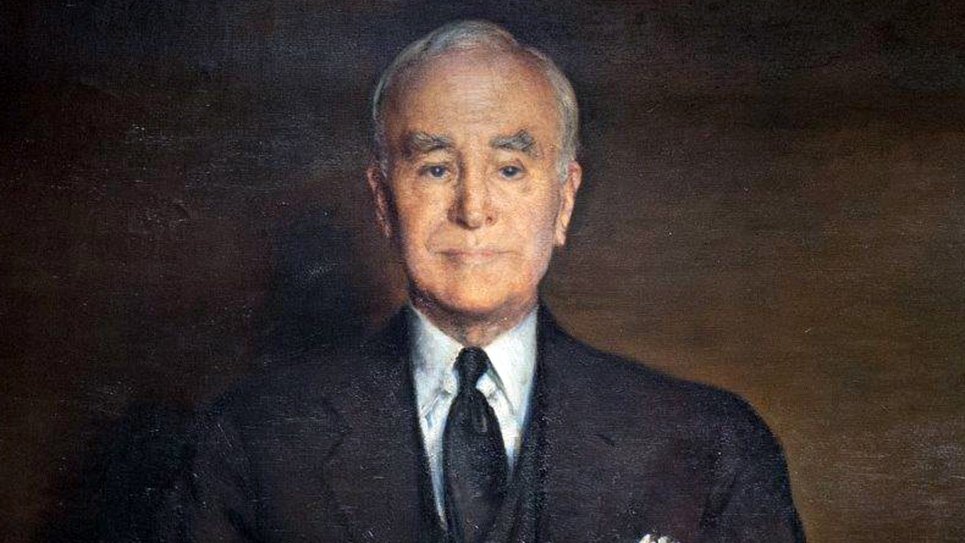Henry Horton had won reelection as governor in 1930, but within days the landscape of Tennessee politics was forever altered. Both Horton and his closest political adviser
, Luke Lea, were made politically impotent when Caldwell and Company, one of the biggest banking concerns in the South, failed. Rogers Caldwell had been very successful and was closely associated with Luke Lea, both politically and financially.
Rogers Caldwell had also done significant business with the State of Tennessee and when it became public knowledge that Tennessee had lost six and a half million dollars with the collapse of Caldwell and Company, citizens were naturally livid. Indignation meetings were held throughout the state and a committee was formed to investigate the ties between the Horton administration and Caldwell and Company. The legislature promptly initiated impeachment proceedings against Governor Horton.
For weeks there was only a foreboding silence from Shelby County as E. H. Crump held his tongue. With his usual impeccable sense of political timing, Crump announced the machine’s own opposition to the Horton administration. Crump broke not only his silence, but also the tenuous alliance he had forged with Luke Lea and the Horton administration. Crump’s announcement also meant the Shelby County delegation in the legislature would support impeaching Governor Horton.
Luke Lea and the beleaguered Henry Horton fought back, ruthlessly employing patronage and state favors to avoid having the governor impeached. Horton only barely managed to escape the humiliation of impeachment. Despite still clinging to his office, Governor Horton was a spent force in Tennessee politics.
After having served as Mayor of Memphis and Shelby County Trustee, Edward Hull Crump had withdrawn from electoral politics. Crump tended to this growing insurance empire and other business interests, all the while consolidating his grip on the political life of Memphis and Shelby County. In 1930, Crump ended his official electoral exile when he announced his candidacy for Congress.
Crump’s announcement came as a surprise to incumbent Congressman Hubert Fisher. Fisher had first been elected to Congress in 1916 when then-Congressman K. D. McKellar had won election as Tennessee’s first popularly elected United States Senator. Fisher, a lawyer and former U. S. Attorney for the Western district of Tennessee, had quietly served in Congress for fourteen years. As the Tenth Congressional district was entirely composed of Shelby County, there was little doubt about Crump defeating Fisher should the Congressman be so foolish to run again.
E. H. Crump’s decision to go to Congress caused a momentary breach in his friendship and political partnership with Senator McKellar. Hubert Fisher was growing increasingly deaf, to the point where it likely did impair his ability to serve in Congress, but he was also a warm personal friend of McKellar’s and the senator resented Crump’s rough treatment of the Congressman. Fisher wisely decided not to run again and Crump was elected to Congress without opposition.
The brief disagreement between Crump and Senator McKellar followed another spat between the two men. Crump had been highly annoyed when McKellar proposed to promote the Assistant Postmaster, who just happened to be McKellar’s older brother, Clint, to the Postmaster of Memphis position.
The Boss decried the appointment of Clint McKellar as Postmaster of Memphis as “nepotism,” causing Senator McKellar to retort Clint had served as Assistant Postmaster efficiently and honestly for years. McKellar pointed out that were Clint not his brother, there would be no question about his meriting the promotion. While Crump’s mastery of Shelby County and Memphis was unquestioned, Senator McKellar was the master of Federal patronage in Tennessee and insisted his brother receive the promotion over Crump’s protests.
Both the Memphis Boss and Senator McKellar had similar personalities in several respects; both were highly sensitive to any real or imagined slight. McKellar especially could perceive any disagreement as being quite personal and both men had very dominant personalities. Certainly, both McKellar and Crump could handle their respective ends of any argument.
Perhaps wishing to smooth over his relations with McKellar, Crump joined hundreds of other Tennessee Democrats at an event in 1931 promoting the senator as a favorite-son candidate for the Democratic presidential nomination in 1932. McKellar, highly pleased, thanked his friends for the honor, but used the occasion to announce his own support for New York Governor Franklin D. Roosevelt. Crump quickly followed suit and both the Memphis Boss and Senator McKellar attended the 1932 Democratic National Convention where they worked hard on Roosevelt’s behalf. Crump was one of Roosevelt’s floor leaders, while Senator McKellar helped to convince the Texas delegation to drop its support of fellow Texan John Nance Garner and back FDR, which they eventually did. Roosevelt, despite his sunny disposition, was very much a politician and made a clear distinction between those who had supported his candidacy prior to the Chicago convention and those who supported him after he had won the nomination.
President Herbert Hoover, reviled by many Americans for his failure to successfully deal with the deepening Great Depression, proved to be an easy target for E. H. Crump, who possessed a remarkable knack for entertaining invective. Senator McKellar, who loathed Hoover, was even freer with his use of derogatory terms in describing the President and his failed policies.
To no one’s surprise, Franklin Roosevelt defeated Hoover easily. Roosevelt’s promise of a “New Deal” for the country was just as appealing in Tennessee as it was throughout the rest of the country. Crump’s domain of Memphis was suffering terribly from the effects of the Depression.
As businesses and banks alike failed all across the country, Memphis was no exception. Between 1929 and 1933, laborers saw their wages fall fifty-five percent. Public school teachers were forced to accept a reduction in their own wages to keep schools open and finally had to endure the indignity of seeing their salaries paid in scrip by the local government. One national publication speculated in 1934 there were as many as thirty thousand Memphians on the New Deal relief rolls with a like number scrabbling to make a living through selling pencils, matches, apples or anything else to feed and clothe themselves and their families. Another seventy-five thousand Memphis citizens were said to be subsisting on tenuous employment that paid only minimum wages. That same national publication stated fully one half of Memphians lived on $750 per year.
Congressman E. H. Crump and Senator K. D. McKellar faithfully supported the New Deal administration of Franklin Roosevelt. The two Memphis solons voted for virtually every measure sponsored by FDR and McKellar even frequently supported programs that were otherwise controversial in his native southland.
The 1932 election not only brought Franklin Roosevelt to the White House, but also solidified the power of the McKellar – Crump partnership in Tennessee. Luke Lea was desperately trying to cling to power in the wake of the fall of the House of Caldwell and Company. Governor Henry Horton, barely having escaped impeachment, was no longer a viable candidate to succeed himself and Lea frantically searched for a replacement. The fact he settled upon former Governor Malcolm Patterson was an indication of just how much his position in Tennessee politics had deteriorated.
Patterson had served two terms as governor before being driven from office over the assassination of his recent opponent in a primary election, Edward Ward Carmack. When Patterson promptly pardoned the convicted killer of Carmack, the outrage of Tennesseans had caused him to retire. Patterson’s attempted to regain his place in Tennessee politics by becoming a candidate for the U. S. Senate in 1916. Although Patterson managed to get more votes than incumbent Senator Luke Lea, he lost to Kenneth McKellar. Patterson had also been embarrassed by an episode that had been highly publicized when he was discovered drunk in a whorehouse.
In 1932, Patterson was a local judge in Shelby County and a changed man; once fond of the bottle, Patterson now claimed to have reformed and was a frequent lecturer on the evils of strong drink. Despite having the support of Luke Lea and Lea’s publishing empire, Patterson made little impact on the gubernatorial race in 1932, running a poor third.
The contest was between Hill McAlister, making his third bid for the Democratic nomination for governor against Lewis Pope, a former official in the Cabinet of the late Governor Austin Peay. McAlister once again had the support of both Senator McKellar and Boss Crump. It was another close race for McAlister, but this time he won, once again getting heavy support in Tennessee’s more urban areas.
Lewis Pope immediately complained he had been cheated out of the nomination and claimed McAlister’s victory had only been accomplished through wide spread voter fraud. Pope fingered Crump, pointing to the huge majority in Shelby County for McAlister and charged Crump and the Memphis machine had fraudulently inflated the vote for Hill McAlister.
Pope declared he would not abide by the decision of Tennessee Democrats in the primary and would run in the general election as an “Independent”. Most Tennesseans were not moved by Pope’s charges of fraud nor were they especially interested in his condemnation of E. H. Crump and the Shelby County machine. Hill McAlister won the general election, giving both Senator McKellar and Crump a large say in the distribution of state patronage, while McKellar controlled virtually all the Federal patronage following FDR’s election.
Governor McAlister quickly moved to remove the appointees installed by his predecessor Henry Horton and anyone with ties to Luke Lea was immediately displaced. All were replaced by McKellar and Crump loyalists.







